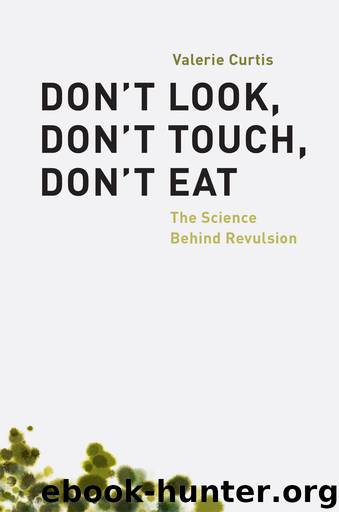Don't Look, Don't Touch, Don't Eat: The Science Behind Revulsion by Valerie Curtis

Author:Valerie Curtis [Curtis, Valerie]
Language: eng
Format: epub
Publisher: University of Chicago Press
Published: 2013-06-10T16:00:00+00:00
EPILOGUE
DISGUST: THE UNFINISHED STORY
What does the future hold for disgust? The blooming field of disgustology is going to be an exciting place in the near future. We are not just going to learn a lot more about behavior relating to microbes, manners, and morality, but we will also blaze a trail for a new approach to brains and behavior. The implications are tremendous.
Psychology still has a long way to go before it can be regarded as a proper scientific discipline. The tools of psychological investigation are in their infancy; we’ve had the delicate probes and the huge rumbling scanners that can peer into living brains for only a couple of decades. Human brains are hard to study, as they are perhaps the most complex objects in existence. But these are only partial reasons for our slow progress.
In physics, the search for the Higgs boson began only after theoreticians had predicted that this fundamental particle should, of necessity, exist. The Large Hadron Collider was built to test a hypothesis that came out of theory. And theory is the right place to start in all of science. Patterns are noticed, a theory that explains the pattern is propounded, hypotheses are generated, and these are tested on new evidence. If the results do not fit the prediction, the hypothesis is wrong and so, probably, is the theory (or maybe the observations are mistaken—replication is important—either way).
Psychologists, however, distrust theory. Perhaps there have been too many wrong theories, like the work of Freud or Jung, or too many partial theories, like Pavlovian conditioning, cognitive dissonance, or the theory of reasoned action. Perhaps it is hard to theorize about brains because we are too close to them, and thinking about thinking about thinking soon becomes mind-bogglingly recursive. Or perhaps we’ve been too subjective, seeing human brains as special and therefore beyond theorizing.
The good news is that psychology is in the process of acquiring objective theory, and so is becoming a proper science. The theory that scientific psychology needs has been around for 150 years, but it has been misunderstood or has been rejected as simplistic or politically incorrect.2 Evolution by natural selection provides our grand unifying theory for explaining brains and behavior.
In this book I’ve used evolutionary theory to propose a function for a class of behavior. Since parasites are a problem for all animals, infectious-disease-avoidance behavior must feature in the repertoire of all animals.3 I found that the PAT of disgust neatly predicted the classes of behaviors that animals, including humans, engage in to avoid becoming prey to parasites. PAT gives us a simple, coherent, and parsimonious story about disgust that avoids some of the mental gymnastics employed by others who have tried to explain it.
The Disgust Agenda
But is PAT right? There is still a huge amount of research that we need to do to test the theory to destruction. What hypotheses can we test to check it out?
First, the story of animal infectious-disease avoidance needs completing. I predict that every species of fish,
Download
This site does not store any files on its server. We only index and link to content provided by other sites. Please contact the content providers to delete copyright contents if any and email us, we'll remove relevant links or contents immediately.
| Cell Biology | Developmental Biology |
| Entomology | Marine Biology |
| Microbiology | Molecular Biology |
| Biostatistics |
Sapiens: A Brief History of Humankind by Yuval Noah Harari(14362)
The Tidewater Tales by John Barth(12649)
Mastermind: How to Think Like Sherlock Holmes by Maria Konnikova(7320)
Do No Harm Stories of Life, Death and Brain Surgery by Henry Marsh(6933)
The Thirst by Nesbo Jo(6930)
Why We Sleep: Unlocking the Power of Sleep and Dreams by Matthew Walker(6699)
Life 3.0: Being Human in the Age of Artificial Intelligence by Tegmark Max(5545)
Sapiens by Yuval Noah Harari(5364)
The Body: A Guide for Occupants by Bill Bryson(5079)
The Longevity Diet by Valter Longo(5057)
The Rules Do Not Apply by Ariel Levy(4957)
The Immortal Life of Henrietta Lacks by Rebecca Skloot(4571)
Animal Frequency by Melissa Alvarez(4459)
Why We Sleep by Matthew Walker(4433)
The Hacking of the American Mind by Robert H. Lustig(4375)
Yoga Anatomy by Kaminoff Leslie(4358)
All Creatures Great and Small by James Herriot(4310)
Double Down (Diary of a Wimpy Kid Book 11) by Jeff Kinney(4260)
Embedded Programming with Modern C++ Cookbook by Igor Viarheichyk(4173)
